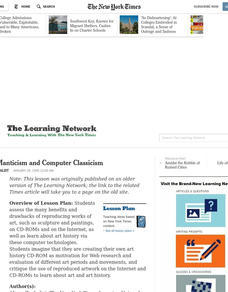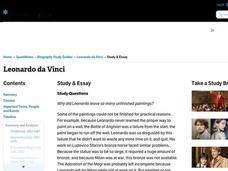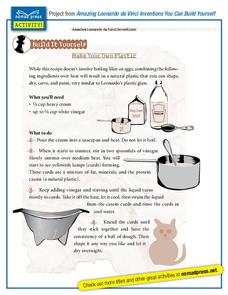Curated OER
Ambassadors of Art
Have your class create their own art exhibit. Learners study the exchange of artwork between the Louvre in Paris and two American art museums, and create an introductory exhibit featuring European and American art from the Renaissance...
Curated OER
Leonardo da Vinci
Young scholars examine the life of artist Leonardo da Vinci. They tour his birthplace via a virtual tour. They explore his many different paintings and sculptures. They discover his personal history and discuss his most famous painting,...
Curated OER
The Great Migration
Students explore how migration to Harlem created a new life for African Americans. In this cross curricular lesson, students illustrate maps showing the migration, paint murals representing African American life in the South and create a...
Museum of Science
Linear Perspective: Painting Distance with Size
Young scholars examine a simple set up to measure the change in the apparent size of an object as it moves away from them.
Curated OER
Different Points of View
Considering an examination of point of view? Use visual arts to engage learners in of this element of art and literature. Class members select a portrait from the Renaissance Connection and, guided by a series of brainstorming...
Curated OER
Neo-Classicism
Taking students from the origins of Neoclassical art, architecture, sculpture, painting, and decorative arts to the "sunset" of the artistic movement, this slideshow provides ample infomation and examples of the art form. The slides...
National Gallery of Canada
Reading Symbols
Introduce your upper-elementary students to printmaking. Class members view prints, select and research symbols in a piece, and create their own sets of prints using styrofoam trays. Pupils can wash off the paint on their trays to make...
National Gallery of Canada
My First Print
Practice printmaking with a fun lesson. After observing images, class members use the listed materials, such as stamps and sponges, create their own prints. They experiment with layering, pressure, and paint colors.
Curated OER
Review of Landscapes, Portraits
First graders examine the term landscape painting, and compare several landscape paintings in their use of color, line, and shape. They create winter landscapes on paper, then observe two Renaissance portraits.
Curated OER
Seeing the Invisible: Angels and Demons
Students search for angels and demons within the paintings in the Getty's medieval and Renaissance galleries. They examine the ways that artists made these invisible creatures visible.
Curated OER
Eye-Popping Op Art
Students examine and discuss work of Hungarian artist Victor Vasarely, recognize visual components of Op Art, compare traditional Renaissance perspective with Op Art's illusion of three-dimensional space, and create original painting...
Curated OER
Self-Portraits Inspired By Saint Helena
Students create their own self-portrait revealing personal information employing two types of aesthetics: imitation and expression. Emphasis is placed on the painting "Saint Helena with True Cross" created by Lucus Cranch the Elder.
Curated OER
Visual Art: Romare Bearden and Group 306
Students examine the life and art of Romare Bearden. Using his "Mill Hand's Lunch Bucket" for inspiration, they write a first chapter for a book. Students observe numerous other works of his art and discuss them from artistic and...
Curated OER
Morley [LAM 4]
Students use a bar and beat numbers to identify various terms of vocal music in this organized worksheet. Then they explain the use of texture within the extract. Students also locate an example of suspension and analyze their treatment....
Museum of Science
Open Window: Using Leonardo's Perspectograph
Young scholars look through one eye and trace the outlines of objects seen through a window to create a drawing with natural and correct perspective.
Curated OER
Langston Hughes: Dream Variations
Students examine African-American communal life. In this Langston Hughes lesson, students read poetry by Hughes in order to gain insight into the Harlem community. Students select artwork that represents their community.
Curated OER
New York State Testing Program: English Language Arts Book 2
Practice listening and writing skills with this resource. This is a test created by the New York State Testing Program. Learners listen to a passage called "Leonardo da Vinci's Mona Lisa" twice and write responses to the selection. They...
Curated OER
An Exploration of Leonardo da Vinci's Life and Work
The original Renaissance man, da Vinci is a wonderful subject through which to discuss history, art and science.
Curated OER
Fiddling Around
Students look at a piece of art to make connections between early Baroque art and Baroque music. In this art and music instructional activity, students focus on the painting The Boy Violinist, by Hendrick Terbrugghen. They listen to the...
Curated OER
CD-ROManticism and Computer Classicism
Students assess the many benefits and drawbacks of reproducing works of art, such as sculpture and paintings, on CD-ROMs and on the Internet, as well as explore art history via these computer technologies.
Curated OER
What's Right and Wrong? Moral Messages in Art
Students explore the Steen and Mount paintings and their presentation of moral issues. They discuss ethical debates in society today and write a short position paper on an issue raised by the paintings or in the discussion. They make a...
Curated OER
Leonardo da Vinci
Are you studying Leonardo da Vinci in your class? This resource is made up of 3 study questions and 7 essay topics about Leonardo da Vinci that you could use to test your learners' biographical knowledge. Class members may check some of...
Nomad Press
Amazing Leonardo da Vinci Inventions: Make Your Own Plastic
When you hear Leonardo da Vinci mentioned, chances are that you think of the Mona Lisa, or flying machines—but what about plastic? Learners blend heavy cream and vinegar over heat to replicate da Vinci's early organic plastic recipe.
Curated OER
Proper Perspective
Students consider what makes a famous painting realistic, then examine a theoretical debate about how Renaissance masters created their true-to-life images. They create their own realistic drawings.




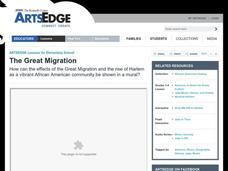
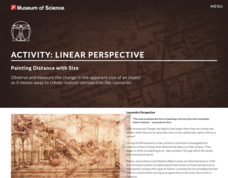








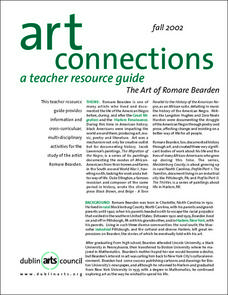
![Morley [LAM 4] Worksheet Morley [LAM 4] Worksheet](http://content.lessonplanet.com/resources/thumbnails/166274/large/cgrmlwnvbnzlcnqymdezmdmzmc0yodixmi03d2vsdziuanbn.jpg?1414266623)





